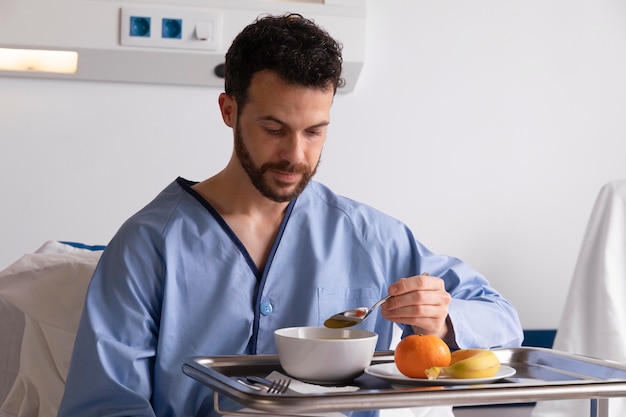Fasting prior to surgery is an important procedure that has a direct impact on patient safety; it is not merely a formality. The amount of time you spend without food and liquids during any surgery, no matter how big or small, can make the difference between a successful procedure and unanticipated problems.
However, despite its significance, patients frequently misunderstand fasting instructions. Some people question why clear liquids are still permitted closer to the procedure while solid foods are prohibited well in advance of the procedure. Others are concerned about discomfort from prolonged fasting or dehydration. Patients can feel more at ease and be ready for a safer experience if they understand the science behind preoperative fasting.
Fasting Guidelines for Surgery
| Food & Drink Type | When to Stop Before Surgery |
|---|---|
| Solid Foods & Dairy | 6-8 hours before arrival |
| Alcoholic Beverages | 8 hours before arrival |
| Clear Liquids (water, apple juice, black coffee, tea) | Up to 2 hours before arrival |
| Milk, Cream, Smoothies | Not allowed during fasting |
| Heavy Meals (fatty foods, meat, fried dishes) | May require a longer fasting period |
🔗 For official pre-surgery guidelines, visit: American Society of Anesthesiologists (ASA)
Why Is It Important to Fast Before Surgery?
The body’s ability to keep stomach contents out of the lungs is impacted by anesthesia. Food and liquids are normally prevented from moving in the wrong direction by protective reflexes. These reflexes, however, are diminished when under anesthesia. Aspiration pneumonia, a condition in which stomach contents inadvertently enter the lungs, can result in life-threatening complications such as infections or respiratory issues.
Fasting gives the stomach enough time to empty before surgery, which lowers the risk of aspiration. Whether you are undergoing regional anesthesia, sedation, or general anesthesia, this guarantees a safer and more regulated procedure.
Anesthesia Types and Their Needs for Fasting
Fasting is not necessary for every surgery, but for those that are, the length of the fast depends on the kind of anesthesia.
- General Anesthesia: Strict fasting guidelines are necessary to avoid complications because you will be totally unconscious.
- Depending on the procedure, regional anesthesia may still necessitate fasting even though it numbs a particular area, such as an arm or leg.
- Sedation: A moderate fasting period is typically necessary if you are prescribed medication to relax while staying semi-conscious.
- Local Anesthesia: Unless paired with sedation, fasting might not be required for minor procedures.
What Takes Place If You Consume Food or Drinks Too Soon Before Surgery?
“What if I accidentally eat or drink before surgery?” is a common question from patients. What, when, and how much was consumed all influence the response.
- Eating solid food within six hours of surgery increases the risk of aspiration because undigested food stays in the stomach.
- After anesthesia, consuming liquids too late may result in nausea and vomiting.
- Extra care is taken in emergency situations, but if you don’t follow the fasting instructions, your elective surgery may be delayed.
💡 Advice: Tell your doctor straight out if you accidentally eat or drink. During anesthesia, lying could seriously jeopardize your health.
Guidelines for Children and Infants on Fasting
Adults and infants have different fasting guidelines. Dehydration poses a greater risk because of their accelerated metabolism.
| Age Group | Breast Milk | Formula/Milk | Clear Liquids | Solid Foods |
|---|---|---|---|---|
| Infants (<6 months) | Up to 4 hours before surgery | Not advised | Up to 1 hour before | Not allowed |
| Babies (6-12 months) | Up to 4 hours before | Up to 6 hours before | Up to 1 hour before | Not allowed |
| Children (1-12 years) | Not applicable | Up to 6 hours before | Up to 2 hours before | Not allowed |
What Makes Clear Liquids Permitted Near Surgery?
Clear liquids move through the stomach more quickly than solid foods, which lowers the risk of aspiration while maintaining patient hydration. Hydration prior to surgery can:
✔️ Reduce post-operative nausea and vertigo
✔️ Prevent excessive thirst or dry mouth prior to anesthesia
✔️ Preserve electrolyte balance
✅ Clear liquids that are approved include:
- Water and clear juices (white cranberry, apple)
- Tea or black coffee without milk or creamer
- Sports beverages (Powerade, Gatorade, and Pedialyte)
Steer clear of: Alcohol, carbonated drinks, smoothies, milk, and protein shakes.
Exceptions: When Regulations Regarding Fasting Alter
Prior to surgery, some procedures call for longer fasting durations or specific diets.
- A clear liquid diet is frequently prescribed to patients 24 hours prior to a colonoscopy or endoscopy.
- Physicians may prescribe a liquid diet for one to two days prior to bariatric (weight-loss) surgery.
- Patients with diabetes: Due to the impact of fasting on blood sugar, physicians may modify insulin dosages or permit trace amounts of glucose prior to surgery.
- Emergency Surgeries: To lower the risk of aspiration, doctors use additional precautions, such as inserting a breathing tube, when fasting is not an option.
What Should You Do If You’re Not Sure Whether to Fast?
Not every hospital has the same fasting guidelines. Before surgery, ask your doctor or nurse if you have any questions. Never assume that general rules apply to your particular situation.
Physicians take into account a number of factors, such as:
✔️ Your medical history
✔️ The procedure you are undergoing
✔️ If you take any food-required medications
🔹 Key Takeaway: To avoid delays, cancellations, or complications, heed the advice of your medical team.


